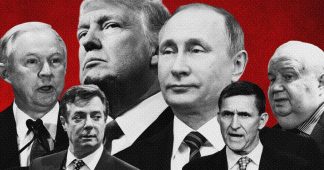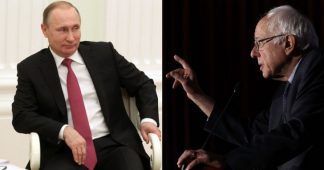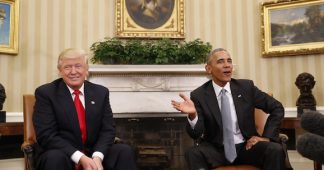By Norman Solomon
When Donald Trump won the presidency, crucial questions begged to be addressed: How could it happen? Was Hillary Clinton seen by voters as too close to Wall Street, too aligned with wealthy elites? Was Bernie Sanders correct that loyalty to the billionaire class would undermine the Democratic ticket’s appeal to working-class voters?
Those were hardly the kinds of questions that Democratic Party leaders and corporate media wanted to put in the national spotlight. Instead, they quickly shifted the focus — to Russia.
Within 24 hours of Clinton’s concession speech, campaign manager Robby Mook and campaign chair John Podesta “assembled her communications team” at the national headquarters in Brooklyn “to engineer the case that the election wasn’t entirely on the up-and-up,” journalists Jonathan Allen and Amie Parnes report in their inside-story book Shattered. “For a couple of hours … they went over the script they would pitch to the press and the public. Already, Russian hacking was the centerpiece of the argument.”
There were real Russian efforts to intervene in the election. But their scope and effects became widely exaggerated. In U.S. media and politics, a laser focus on Russia quickly substituted for examining basic reasons for Clinton’s loss.
The traumatic reality of Trump’s victory called for a serious and well-grounded exploration of the key factors that led to the catastrophe. Such an exploration might have critically assessed the Democratic abandonment of many working-class voters that Senate Minority Leader Chuck Schumer had brashly heralded in July 2016: “For every blue-collar Democrat we lose in western Pennsylvania, we will pick up two moderate Republicans in the suburbs in Philadelphia. And you can repeat that in Ohio and Illinois and Wisconsin.”
The elitism of centrist Democratic orthodoxy — having no use for such progressive proposals as Medicare for All and tuition-free public college — failed to ignite enthusiasm or inspire turnout from the working class. But instead of scrutinizing that political approach, what came to the fore was a fixation on relentlessly blaming Vladimir Putin. It was a fixation that let the party’s leadership off the hook.
The Democratic National Committee went into 2017 with a grand total of one full-time staffer to address the nation’s rampant suppression of voting rights. In the spring, the DNC trumpeted expansion of that staffing to four employees. There was a clear need for legal resources to challenge pernicious voter ID laws and other barriers that had blocked so many people of color from casting their ballots in 2016. Yet in April 2018, when the DNC filed a civil lawsuit, it was against the Russian government (as well as the Trump campaign and associates, WikiLeaks and its founding editor Julian Assange).
From the outset of his presidency, Trump had been guilty of flagrantly violating the Constitution’s foreign and domestic emoluments clauses, which prohibit a president from gaining any personal benefits from government actions. But rather than zero in on the impeachable offenses involving corrupt self-dealing — which are easy for voters to understand — corporate media and leading Democrats focused narrowly on Russia.
As the Trump administration proceeded to inflict a vast array of harm, the Democratic leadership in Congress — and liberal media stars like Rachel Maddow on Comcast-owned MSNBC — persisted with a Russia obsession that would last years. That obsession crowded out attention to an enormous range of moral atrocities being inflicted by the Trump regime, including economic violence against low-income people in the United States and U.S.-aided slaughter by Saudi Arabia in Yemen.
A study by the media watchdog group FAIR found that MSNBC — “the leading liberal cable network” — “did not run a single segment devoted specifically to Yemen in the second half of 2017. And in these latter roughly six months of the year, MSNBC ran nearly 5,000 percent more segments that mentioned Russia than segments that mentioned Yemen.”
FAIR documented that in 2017, the first full year of MSNBC’s ongoing “Russiagate” obsession, the network “only aired one broadcast on the U.S.-backed Saudi airstrikes that have killed thousands of Yemeni civilians. And it never mentioned the impoverished nation’s colossal cholera epidemic, which infected more than 1 million Yemenis in the largest outbreak in recorded history.”
Notwithstanding such realities, the mass media continued to fixate on Russia, while homegrown assaults on democracy became evermore vicious and damaging across the United States.
The fact that the Trump team lied about contacts with Russians caused people to lose sight of the fact that Trump continually lied about almost everything under the sun. Improper business deals and corrupt entanglements of the Trump Organization had been occurring in many countries. And Russia-related news coverage continued to mightily distract all too many progressives from anti-democratic maneuvers that were underway in our own country.
This year, the Transformative Justice Coalition released a list of “61 Forms of Voter Suppression” that have taken hold in the United States — denying basic voting rights due to race, ethnicity, income and age — insidiously preventing millions of people from exercising their democratic rights.
How many of those 61 forms of voter suppression did Russia have something to do with?
Zero.
The dynamics of the Russia obsession have fit a classic pattern in U.S. history — avoiding, and distracting from, key domestic failures — by blaming a foreign power.
In a country rife with systemic and severe shortfalls of democracy, leading Democrats and corporate media were all too pleased to concentrate their rhetorical fire on a faraway adversary. Why blame Wall Street when you can blame the Kremlin? Why examine the power of American oligarchs when you can avoid mentioning they exist, while denouncing Russian oligarchs?
For progressive agendas, the fueling of hostility toward Russia has been unproductive and damaging. Overall, tremendous amounts of time, energy and resources have been squandered on Russiagate-related messaging while a huge spectrum of crucial issues got short shrift. Such dynamics weakened capacities to develop programs and outreach that could appeal to the most deeply felt concerns in communities around the United States.
Meanwhile, prospects for true national security have diminished — with foreseeable and highly dangerous long-term consequences.
Lost in all the torrid anti-Russia rhetoric of recent years was a simple necessity that President Lyndon Johnson (hardly a dove while in the midst of escalating the horrific Vietnam War) expressed at the time of his Glassboro Summit with Alexei Kosygin in June 1967. Standing next to the Soviet premier after more than a dozen hours of direct talks, Johnson said: “We have made further progress in an effort to improve our understanding of each other’s thinking on a number of questions.” Then, as now, the danger of nuclear holocaust made such understanding vital.
But amid the frenzy over Russia, millions of self-identified Democratic moderates, liberals and progressives became fiercely uninterested in any steps to “improve our understanding” of Russian leaders’ thinking. Merely advocating the idea of talks with Putin or “Russians” became tantamount to heresy or being a Putin apologist. Even the most revered peace advocate in Congress got onto the bandwagon.
Meanwhile, the military-industrial complex has profited greatly from growing antagonism toward Russia, coupled with contempt for diplomacy that has helped to rationalize steep military budget increases proposed by Trump and cheered on by House and Senate Democratic leaders. During federal budget negotiations in 2018 — with Trump requesting a staggering 11 percent Pentagon budget increase over two years — Nancy Pelosi boasted in an email to House Democrats: “In our negotiations, Congressional Democrats have been fighting for increases in funding for defense.” The office of Senate Democratic leader Schumer declared: “We fully support President Trump’s Defense Department’s request.” Months later, an overwhelming majority of House and Senate Democrats supported the massive 2019 “National Defense Authorization Act” of $717 billion.
During the last three years, a resurgent atmosphere of cold-war conformity has stigmatized important historic facts — whether about U.S. interference in Russian politics or the dangerous expansion of NATO, which violated an explicit pledge from the George H.W. Bush administration in 1990 that NATO would not expand “one inch eastward.” Wider and wider arrays of inconvenient facts are apt to be tarred as Russian-style disinformation.
This has all been good for the ratings of media stars like Maddow and the profiles of politicians like Democratic Rep. Adam Schiff. But the effects have badly damaged the potential for achieving practical — and essential — measures such as arms control treaties between the world’s two nuclear superpowers. And the enormous pressure on Trump to prove that he isn’t a Putin flunky after all ended up encouraging such perilous moves as U.S. withdrawal from the Intermediate-Range Nuclear Forces Treaty.
“Tensions are festering between two nations with large quantities of nuclear weapons on virtual hair-trigger alert; yet the current partisan fixations in Washington are ignoring the dangers to global stability and, ultimately, human survival,” an open letter published by The Nation pointed out last year.
The letter, which I signed, added: “No political advantage, real or imagined, could possibly compensate for the consequences if even a fraction of U.S. and Russian arsenals were to be utilized in a thermonuclear exchange. The tacit pretense that the worsening of U.S.-Russian relations does not worsen the odds of survival for the next generations is profoundly false.”
* Norman Solomon is co-founder and national coordinator of RootsAction. He was a Bernie Sanders delegate from California to the 2016 Democratic National Convention and is currently a coordinator of the relaunched Bernie Delegates Network. Solomon is the author of a dozen books, including War Made Easy: How Presidents and Pundits Keep Spinning Us to Death. He founded the Institute for Public Accuracy, where he is executive director.
Published at https://truthout.org/articles/the-frenzy-about-russia-has-undermined-progressive-agendas/











